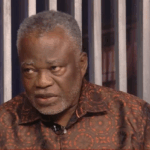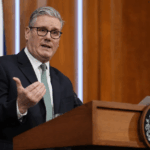
Retired military officer and security consultant, Colonel Festus Aboagye (Rtd.), says there is no strong justification to increase the age limit for enlistment into the Ghana Armed Forces (GAF), following recent calls by Members of Parliament Sam George and Rockson-Nelson Dafeamekpor for a review of the existing policy.
Earlier, the Member of Parliament for South Dayi, Rockson-Nelson Dafeamekpor, said in a post on X that he had received several complaints from citizens regarding the age restriction for army recruitment.
He shared an analysis of enlistment age limits across Africa, Europe, Asia, and North America, showing that many countries allow recruitment beyond 30 years.
According to his findings, countries such as Benin, Côte d’Ivoire, Togo, and Nigeria have maximum enlistment ages ranging from 30 to 35 years, while others, including Australia, Germany, and the United Kingdom, go as high as 36 or even 50 years depending on the role.
He therefore suggested that Ghana could extend its age limit to 35 or even 40 years, depending on medical fitness and the type of role — especially for non-combatant positions.
On Wednesday, October 8, Minister for Communications, Sam George, also posted on X, supporting a review of the current age restrictions. He argued that many Ghanaians in their 30s remain physically fit and capable of serving.
However, speaking on JoyNews’ News Desk the same day, Col. Aboagye (Rtd.) disagreed, insisting that the current system works effectively and that there is no shortage of recruits to justify such a change.
“I don’t have a clear understanding of the context in which the Minister made that pronouncement,” he said.
“I have the sense that he assumes the Armed Forces are not getting enough people to recruit, which is certainly not the case. If you open up recruitment as the Armed Forces is doing now, you’ll have tens of thousands applying.”
He explained that unless there was a shortage of qualified recruits, there would be no need to expand the age limit.
“If there had been a shortage of qualified materials to recruit, then you could make the argument to expand the age bracket in order to bring in more eligible candidates. But as we speak, that is not the case,” he said.
Col. Aboagye clarified that the current recruitment structure already provides some flexibility, particularly for professionals.
“For the regular soldier, recruitment goes up to 25 years, but there’s some allowance — maybe an extra two to five years — for professionals with scarce competencies like engineers,” he explained.
“However, for rank-and-file soldiers and officers, it’s better to recruit them young so that they can serve for about 25 years, as soldiers typically do.”
He warned that raising the enlistment age could distort the service structure and shorten the career lifespan of officers.
“If they join at 25 and retire after 25 years, they’ll be 50. If you increase the entry age to 30, then you push the retirement limit higher, creating a ripple effect across the ranks,” he noted.
The retired colonel also cited potential health and social implications of raising the age limit.
“As we age, health challenges increase. Recruiting older individuals would likely raise the Ministry of Defence’s health budget because more personnel would require medical attention at the military hospital,” he cautioned.
He further warned that widening the age range could lead to social and leadership tensions within the ranks.
“If you expand the range to 30 while keeping the lower limit at 20, you’ll have 20- and 30-year-olds in the same intake. A younger, more competent person could end up leading an older one, which may create uncomfortable social dynamics,” he explained.
Meanwhile, the Ghana Armed Forces has announced that its 2025 enlistment and recruitment exercise will commence in the coming days across all 16 regional capitals of the country.




